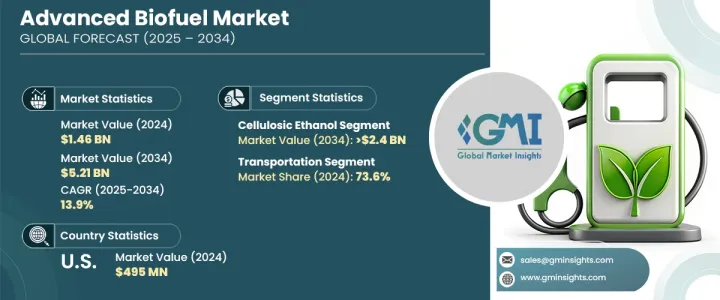
|
시장보고서
상품코드
1699392
첨단 바이오연료 시장 기회, 성장 촉진요인, 산업 동향 분석 및 예측(2025-2034년)Advanced Biofuel Market Opportunity, Growth Drivers, Industry Trend Analysis, and Forecast 2025-2034 |
||||||
세계 첨단 바이오연료 시장은 2024년 14억 6,000만 달러로 평가되었고, 2025-2034년 연평균 13.9%의 성장률을 보일 것으로 예측됩니다.
이러한 성장은 각국이 에너지 안보, 이산화탄소 배출량 감축, 장기적인 에너지 다변화를 우선시하는 가운데 지속가능한 대체 에너지에 대한 세계 수요가 증가하고 있음을 반영합니다. 세계 각국 정부는 보다 광범위한 기후 변화 목표에 부합하는 형태로 바이오연료 생산을 장려하는 정책을 적극적으로 추진하고 있습니다. 첨단 바이오연료 시장은 화석연료에 대한 의존도를 낮추기 위한 실행 가능한 솔루션으로 성장하고 있으며, 효율성 저하 없이 친환경적인 대체 연료를 제공합니다.

외국산 석유에 대한 의존도를 낮추는 것이 중요해지면서 각국은 재생가능 에너지에 대한 대안을 모색하고 있습니다. 첨단 바이오연료는 기존 연료에 필적하는 성능을 유지하면서도 온실가스 배출량을 크게 줄일 수 있어 최적의 대안으로 각광받고 있습니다. 다양한 국제적인 의무, 보조금 및 세제 혜택은 산업 확대를 더욱 촉진하고 있으며, 첨단 바이오연료는 더욱 친숙하고 경제적으로 실행 가능한 연료가 되고 있습니다. 정제 공정, 특히 원료 최적화 및 효소 가수분해의 기술 발전으로 연료 효율과 비용 효율성이 향상되고 있습니다. 연료 수요 증가와 세계 순 배출량 제로 목표에 따라 이 분야는 향후 10년 동안 상당한 성장이 예상됩니다.
| 시장 범위 | |
|---|---|
| 시작 연도 | 2024년 |
| 예측 연도 | 2025-2034년 |
| 시작 금액 | 14억 6,000만 달러 |
| 예상 금액 | 52억 1,000만 달러 |
| CAGR | 13.9% |
첨단 바이오연료 산업은 2024년 14억 6,850만 달러에 달할 것으로 예상되며, 셀룰로오스계 에탄올, 바이오디젤, 바이오부탄올 등 주요 바이오연료 유형으로 구분됩니다. 그 중 셀룰로오스계 에탄올은 큰 폭의 성장이 예상되며, 2034년까지 시장 평가액은 24억 달러에 달할 것으로 예측됩니다. 셀룰로오스 에탄올은 기존 휘발유에 비해 지속가능성이 뛰어나고 배출가스 저감 특성이 우수하다는 것이 널리 알려져 있습니다. 현재 진행 중인 효소 분해 및 발효 공정의 기술 혁신은 생산 수율과 가격을 향상시켜 시장 도입을 더욱 가속화할 것입니다.
용도별로는 운송 부문이 2024년 73.6%의 점유율로 시장을 주도하고 있으며, 2050년까지 순배출량 제로를 목표로 하는 산업과 국가에게 바이오연료는 교통 분야에서 탄소 배출량을 줄이기 위한 중요한 솔루션으로 자리매김하고 있습니다. 첨단 바이오연료는 화석 연료에 비해 배출량을 크게 줄일 수 있기 때문에 보다 친환경적인 모빌리티 솔루션으로 선호되고 있습니다. 전기자동차 및 하이브리드 연료 기술이 확대됨에 따라 바이오연료 부문은 새로운 운송 혁신과 원활하게 통합될 것으로 예상됩니다.
미국의 선진 바이오연료 시장 규모는 2024년 4억 9,500만 달러로, 옥수수, 대두, 농업 폐기물 등 풍부한 농업 원료 공급이 그 원동력이 되고 있습니다. 이 나라는 재생 가능 에너지에 전략적으로 집중하고 있으며, 엄격한 환경 규제와 함께 시장 성장을 가속하고 있습니다. 재생가능 연료 기준(RFS)과 같은 정책은 국가 연료 공급에 재생가능 연료의 혼합을 의무화함으로써 바이오연료의 채택을 지속적으로 지원하고 있습니다. 탄소중립을 향한 움직임과 바이오 정제 인프라에 대한 대규모 투자로 미국은 세계 바이오연료 시장의 주요 기업로서 입지를 확고히할 것으로 예상됩니다.
목차
제1장 조사 방법과 조사 범위
제2장 주요 요약
제3장 업계 인사이트
- 업계 에코시스템
- 규제 상황
- 업계에 대한 영향요인
- 성장 촉진요인
- 업계의 잠재적 리스크&과제
- 성장 가능성 분석
- Porter's Five Forces 분석
- PESTEL 분석
제4장 경쟁 구도
- 서론
- 전략 대시보드
- 혁신과 지속가능성 전망
제5장 시장 규모와 예측 : 연료 유형별, 2021년-2034년
- 주요 동향
- 셀룰로오스계 에탄올
- 바이오 디젤
- 바이오 부탄올
- 기타
제6장 시장 규모와 예측 : 원료별, 2021년-2034년
- 주요 동향
- 농업
- 임업
- 폐기물
- 기타
제7장 시장 규모와 예측 : 용도별, 2021년-2034년
- 주요 동향
- 운송
- 항공
- 기타
제8장 시장 규모와 예측 : 지역별, 2021년-2034년
- 주요 동향
- 북미
- 미국
- 캐나다
- 유럽
- 독일
- 프랑스
- 스페인
- 영국
- 이탈리아
- 아시아태평양
- 중국
- 인도
- 인도네시아
- 호주
- 중동 및 아프리카
- 사우디아라비아
- 남아프리카공화국
- 라틴아메리카
- 브라질
- 아르헨티나
제9장 기업 개요
- Advanced Biofuel Solutions
- BP
- Clariant
- ExxonMobil
- Gevo
- GranBio
- Green Plains
- Iogen
- POET
- Solix Biofuels
The Global Advanced Biofuel Market was valued at USD 1.46 billion in 2024 and is projected to expand at a CAGR of 13.9% between 2025 and 2034. This growth reflects the rising global demand for sustainable energy alternatives as countries prioritize energy security, carbon footprint reduction, and long-term energy diversification. Governments worldwide are actively promoting policies that encourage biofuel production, aligning with broader climate goals. The advanced biofuel market is gaining momentum as a viable solution to mitigate dependence on fossil fuels, offering an eco-friendly alternative without compromising efficiency.

The increasing emphasis on reducing reliance on foreign oil has pushed nations to explore renewable energy options. Advanced biofuels stand out as an optimal choice due to their ability to significantly lower greenhouse gas emissions while maintaining performance levels comparable to conventional fuels. Various international mandates, subsidies, and tax incentives are further propelling the industry's expansion, making advanced biofuels more accessible and economically viable. Technological advancements in refining processes, particularly in feedstock optimization and enzymatic hydrolysis, have enhanced fuel efficiency and cost-effectiveness. With rising fuel demands and global net-zero emission targets, the sector is poised for substantial growth over the next decade.
| Market Scope | |
|---|---|
| Start Year | 2024 |
| Forecast Year | 2025-2034 |
| Start Value | $1.46 Billion |
| Forecast Value | $5.21 Billion |
| CAGR | 13.9% |
The advanced biofuel industry reached USD 1,468.5 million in 2024, segmented into key biofuel types such as cellulosic ethanol, biodiesel, biobutanol, and others. Among these, cellulosic ethanol is expected to witness significant expansion, with market valuation anticipated to reach USD 2.4 billion by 2034. Cellulosic ethanol is widely recognized for its sustainability advantages and superior emission-reducing properties compared to traditional gasoline. Ongoing innovations in enzymatic breakdown and fermentation processes are set to enhance production yields and affordability, further accelerating market adoption.
Application-wise, the transportation sector led the market with a 73.6% share in 2024. As industries and nations strive toward achieving net-zero emissions by 2050, biofuels continue to be a key solution for lowering carbon footprints in transportation. Advanced biofuels deliver a substantial reduction in emissions relative to fossil fuels, positioning them as a preferred alternative for greener mobility solutions. With the expansion of electric vehicles and hybrid fuel technologies, the biofuel sector is expected to integrate seamlessly with emerging transport innovations.
The U.S. Advanced Biofuel Market was valued at USD 495 million in 2024, driven by an abundant supply of agricultural feedstocks, including corn, soybean, and agricultural waste. The country's strategic focus on renewable energy, combined with stringent environmental regulations, is fostering market growth. Policies such as the Renewable Fuel Standard (RFS) continue to support biofuel adoption by mandating renewable fuel blending into the national fuel supply. The increasing push toward carbon neutrality, coupled with significant investments in bio-refining infrastructure, is expected to solidify the U.S. position as a key player in the global biofuel market.
Table of Contents
Chapter 1 Methodology & Scope
- 1.1 Research design
- 1.2 Base estimates & calculations
- 1.3 Forecast calculation
- 1.4 Primary research & validation
- 1.4.1 Primary sources
- 1.4.2 Data mining sources
- 1.5 Market definitions
Chapter 2 Executive Summary
- 2.1 Industry synopsis, 2021 – 2034
Chapter 3 Industry Insights
- 3.1 Industry ecosystem
- 3.2 Regulatory landscape
- 3.3 Industry impact forces
- 3.3.1 Growth drivers
- 3.3.2 Industry pitfalls & challenges
- 3.4 Growth potential analysis
- 3.5 Porter's analysis
- 3.5.1 Bargaining power of suppliers
- 3.5.2 Bargaining power of buyers
- 3.5.3 Threat of new entrants
- 3.5.4 Threat of substitutes
- 3.6 PESTEL analysis
Chapter 4 Competitive landscape, 2024
- 4.1 Introduction
- 4.2 Strategic dashboard
- 4.3 Innovation & sustainability landscape
Chapter 5 Market Size and Forecast, By Fuel Type, 2021 – 2034 (USD Million & MT)
- 5.1 Key trends
- 5.2 Cellulosic ethanol
- 5.3 Biodiesel
- 5.4 Biobutanol
- 5.5 Others
Chapter 6 Market Size and Forecast, By Feedstock, 2021 – 2034 (USD Million & MT)
- 6.1 Key trends
- 6.2 Agriculture
- 6.3 Forestry
- 6.4 Waste
- 6.5 Others
Chapter 7 Market Size and Forecast, By Application, 2021 – 2034 (USD Million & MT)
- 7.1 Key trends
- 7.2 Transportation
- 7.3 Aviation
- 7.4 Others
Chapter 8 Market Size and Forecast, By Region, 2021 – 2034 (USD Million & MT)
- 8.1 Key trends
- 8.2 North America
- 8.2.1 U.S.
- 8.2.2 Canada
- 8.3 Europe
- 8.3.1 Germany
- 8.3.2 France
- 8.3.3 Spain
- 8.3.4 UK
- 8.3.5 Italy
- 8.4 Asia Pacific
- 8.4.1 China
- 8.4.2 India
- 8.4.3 Indonesia
- 8.4.4 Australia
- 8.5 Middle East & Africa
- 8.5.1 Saudi Arabia
- 8.5.2 South Africa
- 8.6 Latin America
- 8.6.1 Brazil
- 8.6.2 Argentina
Chapter 9 Company Profiles
- 9.1 Advanced Biofuel Solutions
- 9.2 BP
- 9.3 Clariant
- 9.4 ExxonMobil
- 9.5 Gevo
- 9.6 GranBio
- 9.7 Green Plains
- 9.8 Iogen
- 9.9 POET
- 9.10 Solix Biofuels
















